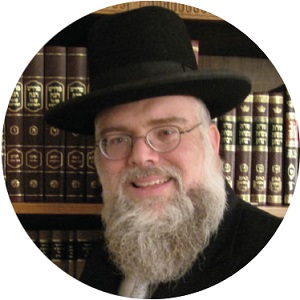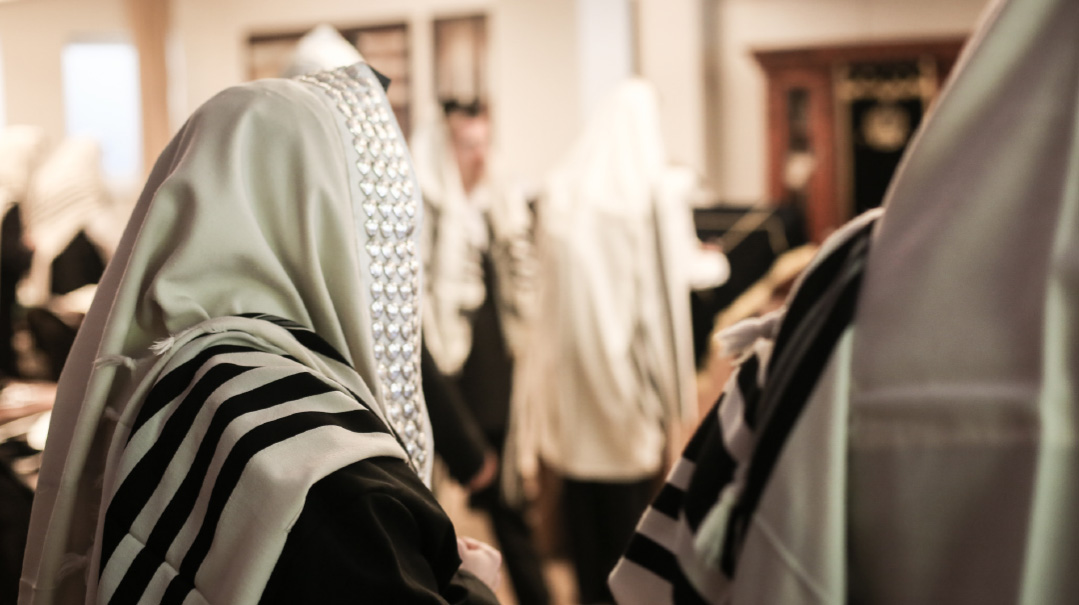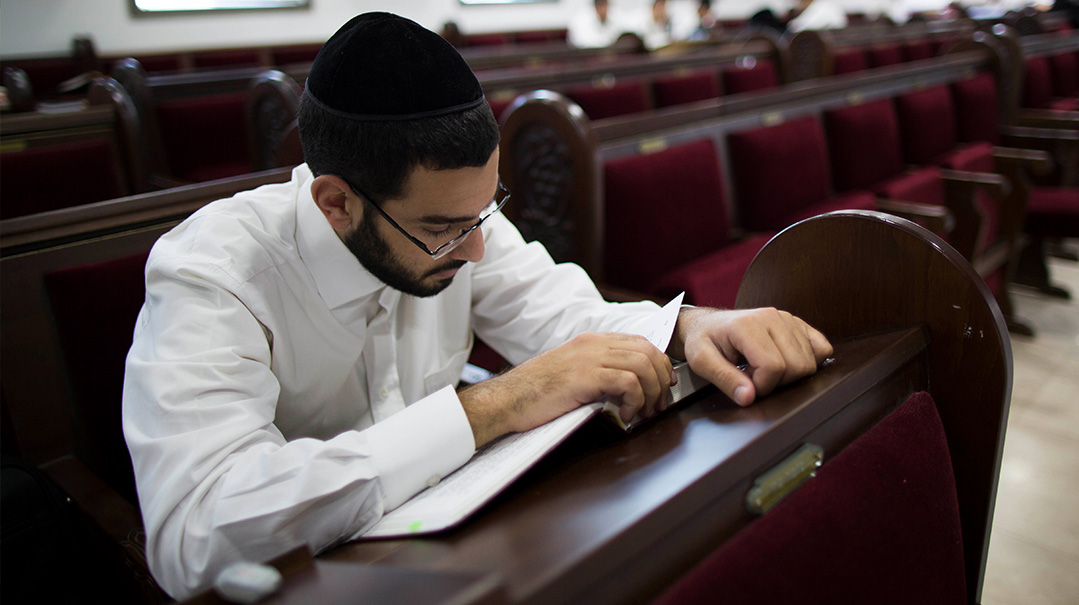Are You Here?

As we answer our own call of ayeka, we need to review the Torah’s mandate to take responsibility for our own shortcomings and indiscretions, and not blame anyone or anything else
Ihave often wondered why certain childhood memories, especially trivial ones, stay with me longer than others. Years later they have a way of coming back, sometimes with a profound lesson.
It was seventh grade, and our rebbi was Rav Lipa Solomon a"h, who learned under the Chofetz Chaim and was a very accomplished talmid chacham in his own right — although that was lost on us at the time. He was close with my family; he and my father a"h were friends back in the glory days of the European yeshivos. But he was also a no-nonsense melamed in the classroom.
One boy in our class was constantly forgetting to do his homework or review his Gemara inside. One day, as Mr. Forgetful drew Rebbi’s attention yet again, we were treated to the following story:
There was a boy who was always forgetting where he put his things. His rebbi advised him to make a list before he went to sleep, keeping a cheshbon of where everything was. He meticulously wrote, “My shirt is on the dresser, my pants are in the closet, and I am in bed!”
The next day he came to school extremely late and was lectured once again by the rebbi — this time for his tardiness. The boy explained that he was simply following the rebbi’s advice. He was getting ready to leave his room and went to check his list one last time. Then he got to the last item — “and I am in bed!” He looked in the bed —but he wasn’t there! He looked and looked, until he finally remembered where he really was at that moment.
I remember giggling at how nonsensical this mashal was. The pashut pshat, I surmised, was that the boy should purchase a notepad and keep track of his responsibilities. The humorous ending was a good way to remember this lesson. Little did I know then that this story originated in the hallowed yeshivos of Novardok. It wasn’t so much about absent-mindedness as it was about life itself.
An incident related by the famed Jerusalem Maggid Rav Sholom Schwadron illustrates this concept. One Monday following his weekly shiur in the Zichron Moshe shul, the Maggid met the Brisker Rav in the street.
“What was the drashah about last Shabbos?" inquired the Rav. “Was there a tzibbur?”
“Baruch Hashem, full wall-to-wall, about 500 people, kein yirbu,” Rav Sholom responded.
“And Rav Sholom,” the Rav continued, “was he there, too?”
As Rav Sholom put it, “Dos iz geven a shoss” — this was a direct hit! As the Maggid explained, if the derashah didn’t affect him personally, what was it worth?
I would suggest that this is the lesson behind the Novardoker mashal. In our world, everything has its place. Our pants, our shirts, our pencils and notebooks. Similarly, we are quick to judge who is the subject of every shmuess. Ah, the rav is talking to Zevy, the rosh yeshivah to Leibel, the rebbi to the class clown.
But where am I? Should I not be learning something from the mussar? My own rebbi, Rav Elya Svei would frequently start the second half of a mussar shmuess or perspective on current events with, “Ober vos hot dos tzu tun mit unz — What relevance does it have to us?” And he would always spell it out and encourage us to take the lesson as far as we could, each one for himself. As the map in the mall points out — you are here.
Truthfully, the first mussar shmuess in the entire Torah touches on this very theme. After Adam Harishon tasted from the forbidden fruit, he attempted to “hide” from Hashem. Soon after, he was taken to task with one word, “Ayeka — where are you." Adam Harishon immediately responds, “It was the woman whom You, Hashem, gave me, who caused my transgression.”
Some mefarshim point out, based on the Seforno, that Adam had every reason to think that if Hashem created Chavah as a helpmate for him, then listening to her could not possibly be an indiscretion. Hashem had designated her to be Adam’s helpmate, and she had urged him to eat the fruit. Therefore, Adam reasoned, this is on her, not me.
But in Hashem’s world, “ayeka” — you have a place in this sin as well. Rav Yaakov Galinsky, invoking the same Novardoker story as above, albeit with a different spin, interpreted ayeka to mean, “Where is the Adam I created, so pure and perfect? He is unrecognizable now, due to his new status as a sinner. I cannot find him.” And of course, all of this happened on the first Rosh Hashanah in history, which is why it became the Yom Hadin for eternity (Ran, Maseches Rosh Hashanah).
We have to ask ourselves some tough questions in light of all we have collectively been through over recent months, as a society in general and as the Am Hanivchar in particular. Do we recognize ourselves? Or more importantly, does Hashem recognize us? Has our commitment to all things holy intensified, or, chalilah, suffered a decline? And if the latter, are we blaming others, or the matzav, or are we owning up to our place in it all?
Tougher yet, did we throw up our hands in defeat, or lend them to those in bigger need than ourselves? Did we direct our fury at politicians and “agenda-niks,” or was our knee-jerk reaction to understand and accept this as a gezeirah from Shamayim, down to the last detail? Did we lean on COVID-19 to excuse ourselves from further aliyah in ruchniyus, or use it as a real catalyst for growth? Where are we now? Where am I now?
Reflex reaction to a situation goes a long way in defining us and showing where we are. Noach bears the imprimatur of ish ha’adamah — a man of the ground — for all eternity, for the indiscretion of planting a grapevine immediately after the Great Flood, which miraculously grew and produced wine in one day. He sincerely felt the need to have an avenue for simchah after such devastation. Yet as Rashi points out, he was reduced from the level of ish kadosh to that of ish chol as a result. That should not have been his first order of business. He would forever be defined as mundane and unholy.
Similarly, our immediate reaction to the incident with Adam Harishon raises a perplexing question: Why was he brought to task? Chazal say he fasted and did teshuvah for the next 130 years, yet he was held accountable for his first reaction. The Seforno says Adam should have immediately done teshuvah instead of throwing the blame heavenward. It would define and diminish him forever. This is where he was.
But there is a flip side as well. A number of years ago I had the distinct privilege of accompanying a world-class shaliach mitzvah in delivering various tzedakah envelopes and other matan b’seser around Jerusalem. My partner for the day informed me that he was taking me to receive a brachah from a woman who was the daughter of a well-known tzaddik with whom I was familiar.
In describing her righteousness, he shared the following anecdote. One Shabbos afternoon, a motorcycle rider on a joyride barreled through the traffic barriers into her closed neighborhood, running over this woman’s daughter and mortally wounding her. Running out of her house, seeing her child lying in the street in the presence of the perpetrator, the woman turned to him and said, “Do you know why this happened? So that you should become a shomer Shabbos now!”
Such a reaction defies description. In the face of unspeakable horror, her knee-jerk reaction was neither grief nor revenge. She rose to incredible and indescribable kedushah. Nobody could ever expect such a reaction from any human being, let alone a mother in mourning. It defined her, that is where she was. I couldn’t wait to receive a brachah from her.
Rav Dovid Povarsky, the great gaon and tzaddik, related an incident from his youth, again showing superhuman kochos. As a teenager, Rav Dovid suffered from a back ailment and went for therapy in a facility in Poltova, his hometown. While he was exercising, a warning spread throughout the building that everyone should hide, as a vicious pogrom had started. He asked a maintenance worker where to take shelter and was advised to run into the bathroom.
As Rav Dovid shared, he couldn’t possibly follow that advice, for in the event he was caught and merited giving his life al kiddush Hashem, he would not be able to recite the brachah of mekadesh es Shimcha. Of course, Hashgachah had it that his life was spared, and he was zocheh to have his 54 years of shiurim printed and learned throughout the entire olam hayeshivos. Some knee-jerk reaction that was. And it defined him. That is where he was.
Although less dramatic, this concept has application in our daily lives. Do we reflexively close our ears to lashon hara? When we hear of an unfortunate situation, do we shake our heads, or hear it as a call to action? So many wonderful organizations began because someone’s reflex was to act. We have Hatzolah, BINA, Bonei Olam, and Renewal, just to name a few. While they may individually be on a smaller scale, there are countless gemachim that collectively have a virtually global reach, each born of someone’s reflexive response to a need. It is what defines us.
On Yom Kippur, we will conclude our Vidui with, “Al cheit shechatanu lifanecha b’simhon levav” — that we sinned through “confusion of the heart.” There are several different interpretations, but one is simply “wondering of the heart” — as with one who thinks, Why is Hashem doing this to me? It can’t possibly be justified, instead of accepting His wise and fair judgment.
Nothing transpires in our lives that is not absolutely ratzon Hashem. It has nothing to do with the school board’s decision to close schools, Dr. Fauci deciding on a new policy, or a mandate from a cranky politician. They are nothing more than puppets in Hashem’s hands, as will be whoever is sworn in as president next January 20 (may Hashem have rachmanus). Our job is responsible hishtadlus, but as we will hear from the shaliach tzibbur on Yemei Hadin, ”L’adam ma’archei lev, u’mei’Hashem maaneh lashon.” We can think and try all we want, yet the actual result is all in His hands. Simple as it sounds, and familiar as the concept may be, it requires constant chizuk and reminders — and practice.
As we answer our own call of ayeka, we need to review the Torah’s mandate to take responsibility for our own shortcomings and indiscretions, and not blame anyone or anything else. We cannot lose sight of the fact that just as the Torah is talking to us personally, so too are current events. It is incumbent upon me to fine-tune my reflexes to immediately detect the guiding hand of Hashem that is absolutely and completely running the world and my life. It is His world and I am there.
But we are not stuck in place. I have often quoted the anecdote of a truck driver in the San Francisco Bay Area who kept having the premonition that one day his truck would go flying off a bridge and he would have to save himself by contorting his body in a protective position. Day after day, he would mentally review his plan so that it would become a reflex, should the dreaded moment arise.
Sure enough, as an earthquake struck in October 1989, he found himself in his truck, driving over the Cypress Street Viaduct, when it buckled, sending his truck hurtling into the neighborhood below. Immediately, as if on cue, he put his arms and legs exactly where they needed to be, and he miraculously survived.
L’havdil, we find the well-known narrative in the Gemara about Rabi Akiva’s last moments on earth, as he willingly gave his life with utmost devotion to Hashem amid unspeakable torture. His disciples asked him in awe how he was able to reach such heights, to which he responded, “My entire life I agonized over this opportunity... when will it come my way, and how will I fulfill it?” Rabi Akiva was giving us the formula. It may be a superhuman feat today, but with commitment, resolve, and hard work, I can do it tomorrow.
Indeed, the Shelah Hakadosh tells us that when reciting Shema Yisrael, one should imagine himself giving his life al kiddush Hashem. This is one of our exercises to enable us to develop our own reflexes and perhaps touch the level of Rabi Akiva in our own way and fine-tune our reflexes to always produce kiddush Hashem.
And as the pasuk states, “Lo nifleis he mimchah — it is not so distant from you; b’ficha u’vilvavcha l’asosah — it is in your mouth and heart to achieve." If we talk about it enough, and think about it even more, our actions will follow. We can get there.
Rabbi Plotnik, a talmid of the yeshivos of Philadelphia and Ponovezh, has been active in rabbanus and chinuch for 25 years and currently serves as Ram in Yeshivas Me’or HaTorah in Chicago.
(Originally featured in Mishpacha, Issue 828)
Oops! We could not locate your form.






